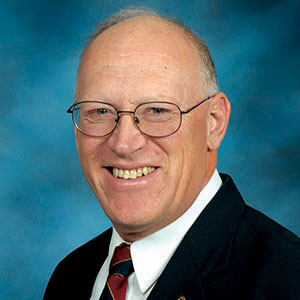Kansas Profile – Now That’s Rural: Dave Nelson, Mt. Zion Church
Sept. 6, 2023
By Ron Wilson, director of the Huck Boyd National Institute for Rural Development at Kansas State University
![]()
There’s a revival going on down at a church east of Manhattan. No, I don’t mean another service; literally, the church building itself is experiencing a revival.
In this case, a historic stone church is being saved and repurposed into a center for the community.
Dave Nelson is a financial advisor in Wamego. A Manhattan High and K-State grad, he has worked on various land development projects. One of the forgotten landmarks near where he lives is the long-closed Mt. Zion Church, a stone building in the countryside five miles east of Manhattan.
At right: Stone tablet, Mt. Zion Church
“A new client walked into my office one day,” Nelson said. “When she told me where she lived, I said, ‘Oh, that’s across from the old Mt. Zion Church.’ Yes, she said, and it’s for sale.”
That got Nelson thinking. Soon after, he was out on his daily morning walk with a friend and neighbor, retired city official Jerry Petty. Nelson said: “What would you think if I bought a church? Would you want to be involved in fixing it up?”
Petty wasn’t sure.
The next morning, the two were walking again. Nelson said, “Well, I own a church. Can you help work on it?”
“When?” Petty replied.
“Well, I have two college kids coming at 9 o’clock this morning,” Nelson said.
That accelerated timeframe began the process of saving the historic Mt. Zion Church. The congregation was affiliated with the United Brethren in Christ. The origin of the church began with the donation of land from the Jacob Hofman family and the construction of the building in 1891. A fire destroyed the structure in 1911 but it was rebuilt in 1912.
Wilma Brooks is a Manhattan-area resident who attended Mt. Zion Church as a child. “In my mind, I can see the inside of that church like it was yesterday,” Brooks said. “The biggest share of (church members) were (her) relatives.”
These and other families kept the church going for decades, but eventually the country church closed. The building itself fell into major disrepair.
“I knew it was a wreck (but) I like stone buildings,” Nelson said.
So, he bought it to restore. He and Petty set out to save and modernize the building for community use. To begin, Petty and the students filled three dumpsters with the old building’s debris.
The long-term plan is for the building to become the United Brethren Mt. Zion Church Community Center, open for neighborhood and community events. Limited repairs were needed on the stone walls which are remarkably straight and strong. A concrete floor has been poured. Plumbing, electricity, new windows and a heating system are being installed.
The original tin steeple, weathervane and church bell will be put back up. An indoor restroom, which the church had not previously had, is being installed.
The project is entirely privately funded; no tax dollars are being used. A Mt. Zion fund has been created to receive tax-deductible donations at the Greater Manhattan Community Foundation.
Donations or discounted services are being provided by several local companies and individuals: Lee Borck, Russ Briggs, MCM, Kolde Construction, Weddle Roofing, Manko Windows, Sean Padgett Masonry, D&G Builders, Larson Construction, Bayer Construction, Boeckman Electric, US Stone, Redi Systems, Mary Vanier’s photography for the windows…and the list is growing.
The church building is located on Mt. Zion Road, east of Manhattan and northwest of the rural community of St. George, population 1,114 people. Now, that’s rural.
“I have a great appreciation for the old-timers who built the old stone barns and buildings,” Nelson said.
Petty adds: “I enjoy historical things. We used to drive by the church and think it would be nice to have that old building restored.”
“We decided the old church needed another hundred years,” Nelson said.
A church revival is underway – not another church service, but a revival and restoration of the church building itself for the benefit of the community. We commend Dave Nelson, Jerry Petty and all those who are making a difference by helping this piece of history to be revived.
Audio and text files of Kansas Profiles are available at http://www.kansasprofile.com. For more information about the Huck Boyd Institute, interested persons can visit http://www.huckboydinstitute.org.
***
The mission of the Huck Boyd National Institute for Rural Development is to enhance rural development by helping rural people help themselves. The Kansas Profile radio series and columns are produced with assistance from the K-State Research and Extension Department of Communications News Media Services unit. A photo of Ron Wilson is available at http://www.ksre.ksu.edu/news/sty/RonWilson.htm. Audio and text files of Kansas Profiles are available at http://www.kansasprofile.com. For more information about the Huck Boyd Institute, interested persons can visit http://www.huckboydinstitute.org.


